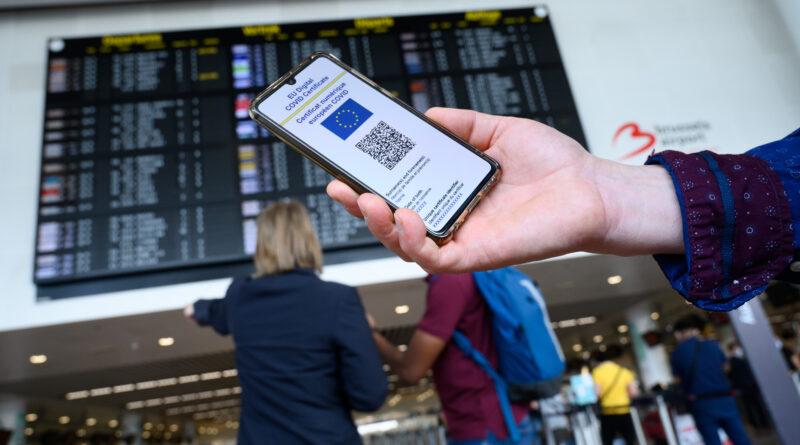How Covid-19 passes work for people travelling between the UK and the EU
Covid-19 passes have become the latest hurdle for people travelling between the UK and the EU. The issue concerns not only holidaymakers, but millions of people trying to see family members in other countries after months of restrictions.
To facilitate travel given the many different national rules, the European Commission has created the ‘digital green certificate’, a system that connects the Covid-19 passes of EU countries, Norway, Iceland, Liechtenstein and Switzerland. San Marino, the Vatican, Andorra and Monaco can access it too. From August 20, the EU also recognises the Covid certificates from Turkey, Ukraine and North Macedonia.
The EU pass proves in a uniform way that the holders have been vaccinated against Covid-19, have recovered from the virus or have tested negative, and should in principle be exempted from quarantine when travelling to another participating state.
Available for free in digital and print format, the certificate contains a QR code with the relevant data that can be scanned by verification apps to check its validity.
It is issued to EU residents and people with the right to travel across the bloc, as well as to EU citizens and their family members who have been vaccinated in a non-EU country.
The UK, having left the bloc, has not adopted the EU pass. So how can people prove their vaccination status when travelling between the UK and EU countries? Like in all other areas, outside the EU framework national rules apply.
Which EU countries recognise the UK Covid pass?
EU countries run their own Covid passes. While they initially focused on opening travel within the EU, several now accept the UK apps and certificates as proof of vaccination for entry purposes.
The map below shows in green the EU countries recognising the UK Covid-19 apps and certificates; in yellow the countries recognising only print certificates or imposing self-isolation to people travelling from the UK regardless of their vaccination status; and in red the countries where there is no formal recognition of the UK pass. The map was developed using information from Re-open EU, the EU portal on travel rules in Europe, and the UK Foreign Office travel advice pages. It was updated on August 14th. Rules constantly change so readers should always check official information sources.
Austria, Croatia, Cyprus, Denmark, Estonia, Finland, France, Germany, Greece, Hungary, Ireland, Italy, Lithuania, Luxembourg, Malta, Poland, Portugal, Romania, Slovakia, Slovenia, Spain, Iceland, Liechtenstein and Switzerland recognise the UK Covid pass, in whichever format, as proof of vaccination, according to official sources. However, it might not always be easy in practice.
Denmark and Italy said they recognise the UK pass for the purpose of accessing restaurants, cinemas and other indoor venues, but travellers from Britain still have to self-isolate upon arrival.
Belgium, Bulgaria, the Czech Republic and Norway permit entry for essential reasons and require travellers from the UK to quarantine regardless of their vaccination status.
Bulgaria and Latvia currently accept only printed UK certificates. Belgium, Norway and Sweden have no formal way to recognise the UK pass, although Belgian authorities are planning to “reciprocate the UK’s recognition of Belgium’s vaccination certificate”, according to the Brussels Times.
Most EU states require travellers from the UK to fill in locator forms and take Covid tests prior to departure too.
Is there an equivalent Covid pass for the UK?
In the UK, the NHS app in England and the CovidCert app in Northern Ireland provide a Covid pass. The NHS app provides certificates also for Covid recovery. People in Wales cannot use the NHS app to get their COVID pass and vaccination status, but they can request a digital version to download and print, according to Wales’ Covid web page.
Scotland issues printed vaccination certificates while a digital system similar to that of the NHS and the EU is in development.
These differences can lead to very different outcomes when travelling in the EU. Print certificates proving vaccination in Scotland, for instance, often are not recognised.
A reader told Europe Street that a German colleague “had no problems having his two English vaccinations transferred to a German digital certificate at a local pharmacy”, while his wife, also a German citizen but vaccinated in Scotland, was unable to have her Scottish certificate transferred to the German pass at the same time and the same pharmacy.
One argument, he told us, was that the Scottish printed form does not give the batch number of the vaccine but only the name and the EU approval code of the vaccine.
In July, the UK lifted quarantine requirements for vaccinated people arriving from European countries, except for France. But only certificates of jabs administered by the NHS were accepted as proof of vaccination. In practice, only vaccinated UK residents were exempted from quarantine and anyone jabbed in the EU still had to self-isolate.
Britons living in EU countries complained at the decision. “It would appear that yet again British citizens abroad are at best an afterthought, not considered at all, or at worst now caught up in the endless disagreements between the UK government and the EU,” the British in Europe coalition wrote in a letter to Transport Secretary Grant Shapps.
In a joint letter to Foreign Secretary Dominic Raab, Massimo Ungaro, MP for for Italian citizens in Europe, and Alexandre Holroyd, MP for French citizens in Northern Europe, urged the British government to lift restrictions and offered to work together “to allow for vaccine recognition”.
Under pressure also from the travel industry, as of August 2nd the government allows people travelling to the UK from European countries and the USA to use their Covid passes as proof of vaccination to avoid quarantine, as long as the vaccine is recognised in the UK. Self-isolation on arrivals from France was waived on August 8th too.
People travelling to the UK from EU countries on the ‘amber list’ still have to fill in a locator form, take a Covid-19 test pre-departure and a PCR test by the second day after arrival.
Can the UK Covid pass be used for domestic restrictions in EU countries?
While participating in the EU pass, each country can decide entry restrictions such as testing, or even the reintroduction of self-isolation, depending on how the pandemic evolves. A growing number of countries are requesting the pass also for access to indoor public spaces, such as restaurants, bars, museums, theatres or gyms.
Denmark was the first EU member state to use the green pass for this purpose. France, Portugal, Italy, Germany, the Netherlands, Belgium, Ireland, Cyprus, Latvia, Lithuania and Luxembourg followed and now require the pass for certain social activities. The Spanish government decided to use the pass only for travel reasons and regional courts ruled against its use for local restrictions.
The UK Covid pass and certificates may not work where domestic restrictions are in place. Jon Worth, a Berlin-based blogger on EU affairs, told Europe Street that while users can import the NHS vaccination certificate in almost every European Covid app, venues use another application to verify the QR codes and let customers in, and most of these apps do not recognise the NHS-generated QR code.
“There are many misunderstandings on the EU Covid app and EU countries have not done a good job in the way they communicate about the issue,” he said.
Initially, only Ireland built an app treating UK citizens in the same way as Irish citizens and verifying UK QR codes, he added. The French and Italian verification apps now also recognise the NHS QR codes (but not other certificates).
Showing a proof of vaccination in any other format might be legally sufficient but is at the discretion of each venue. In fact, problems in this regard have been reported also with EU passes.
The alternative for UK travellers would be importing the NHS QR code into one of the European apps knowing it might not work everywhere, providing a pharmacy in the EU with the necessary information and convincing them to issue the EU pass or taking regular Covid-19 tests that entitle to a pass as well.
The easiest solution, Worth says, would have been getting the automatic recognition of the UK Covid pass in the EU gateway. This, however, would have been a “technically simple but politically tough” option, he argued.
Can people vaccinated in ‘third countries’ obtain the EU green pass?
Under the EU regulation on the green pass, EU citizens and their family members who have been vaccinated in a third country with a vaccine used in the EU can receive an EU digital green certificate by a member state if they provide “reliable” proof of vaccination.
EU citizens living in the UK and their family members can therefore obtain the EU green pass through this route.
Information is only starting to emerge on how to do this. In Austria and Belgium vaccinations received in non-EU countries can be registered by GPs (in Austria paying a fee) and in the Czech Republic via a healthcare provider. In the Netherlands, it is necessary to make an appointment with a special service based in Utrecht. In France and Cyprus citizens vaccinated outside the EU can request the Covid pass via email. In Italy people have to submit the relevant documents to the local health service.
EU countries can issue the pass not only for vaccines approved by the European Medicine Agency (EMA), but also for other vaccines approved by the World Health Organization.
Batches of the AstraZeneca vaccine manufactured in India and used in the UK, for instance, have not been approved by the EMA but are unilaterally recognised in Austria, Bulgaria, Finland, France, Germany, Greece, Hungary, Ireland, Latvia, the Netherlands, Slovenia, Spain, Sweden, as well as Iceland and Switzerland.
However, problems remain in many EU states for people who received from third countries jabs not approved in the EU.
French Tourism Minister Baptiste Lemoyne recently announced that France is preparing to issue a Covid pass also to non-EU tourists and students on the French territory.
A vaccine dose in the UK and another in the EU?
It is possible to receive a dose of vaccine against Covid-19 in the UK and another in the EU. Again, this is managed by local health authorities under national rules.
In the Netherlands, vaccines received in different countries are registered by a dedicated service in Utrecht. In Italy the green pass is issued only if the second jab is given within the time period decided by Italian authorities (it is shorter than the UK).
At Europe Street, we have tested getting the first dose of the Covid-19 vaccine in the UK and the second in Italy.
In Italy the vaccination programme is organised at regional level. Although users are not allowed to add data in the online booking platform, the local health service could register manually the first dose received in the UK and book a second dose, after which the EU green pass was automatically generated.
As for the UK registration of the dose received in Italy, the GP requested the vaccine certificate and inserted manually the data in the NHS system. But we were told the NHS app is not ready yet to recognise jabs received abroad.
Claudia Delpero © all rights reserved
This article was published on August 15 and was updated on August 21 with the latest information about the passes of Turkey, Ukraine and North Macedonia, and clarifications about the Scottish Covid certificate. Photo by Christophe Licoppe © European Union, 2021
Europe Street News is an online magazine covering citizens’ rights in the EU and the UK. We are fully independent and we are committed to providing factual, accurate and reliable information. As citizens’ rights are at the core of democracy, our website and newsletter are available for free. Please consider making a contribution so we can continue and expand our coverage. Thank you!




